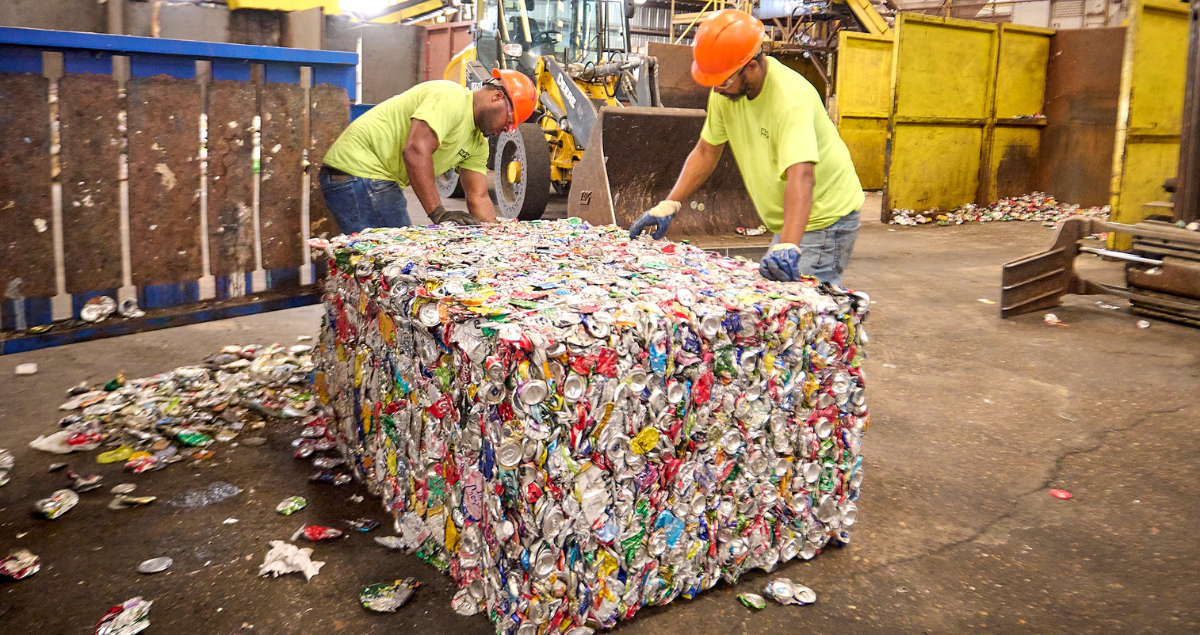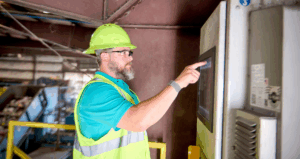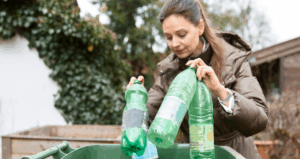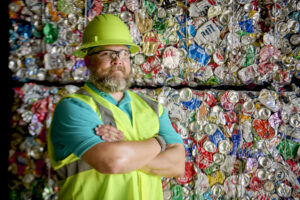Recycling is a widely supported and valued service, but confusion about what can and can’t go in the bin remains a major challenge. According to The Recycling Partnership:
- 80% of Americans surveyed believe recycling has a positive impact and makes a difference and 70% say it’s worth the effort.
- More than two-thirds are motivated by reducing waste and protecting the planet.
Yet nearly 30% of what goes into recycling bins doesn’t belong there, leading to contamination that can send entire loads to the landfill. Misconceptions can lead to bad recycling practices, but the good news is they’re easy to clear up. By understanding the facts, we can all recycle smarter and make a greater impact on the environment. Let’s set the record straight and debunk some of the biggest recycling myths.
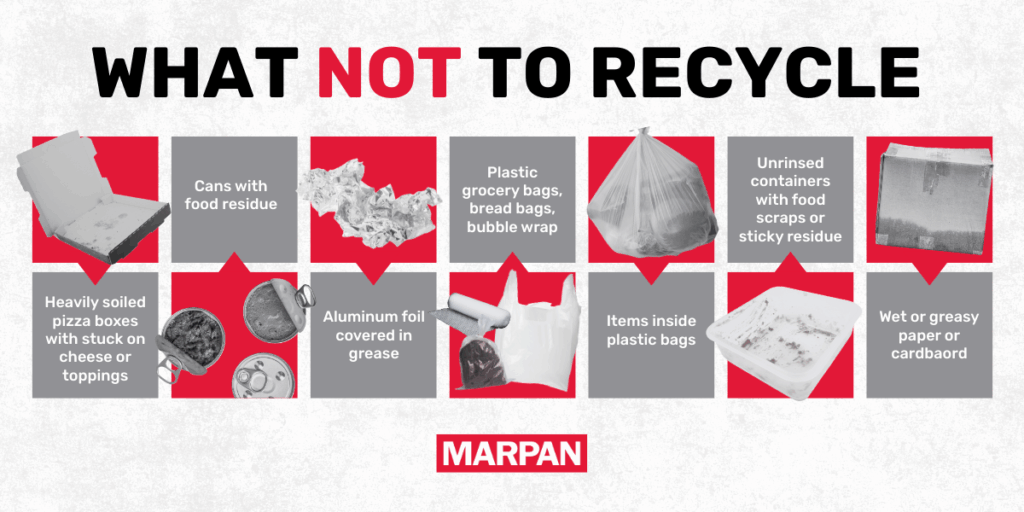
The Most Common Recycling Myths
Myth: Whatever I put in the recycling bin just goes to the landfill.
Truth: Most recyclables don’t end up in the landfill unless they’re contaminated or incorrectly sorted.
Here’s the Reality
- Recycling works when done right. Most clean and properly sorted recyclables are processed and reused. Materials such as aluminum, cardboard, certain plastics and paper have strong markets and are actively recycled.
- Contamination is the problem. Items with food residue, non-recyclable materials or incorrectly sorted waste can ruin a whole batch, causing it to be landfilled.
- Infrastructure matters. Some areas have more advanced recycling programs than others, but across the U.S., many municipalities track and report real recycling rates and they prove that when residents follow the rules, recycling does make it through the system.
The Bottom Line
If you recycle correctly (i.e. clean items, check local guidelines) your efforts don’t go to waste. In fact, they help reduce pollution, save resources and support the local economy.
Myth: Recycling uses more energy than it saves.
Truth: Recycling saves energy, often much more than people realize.
Here’s the Reality
- Recycling materials uses less energy than producing new ones. According to the U.S. Environmental Protection Agency, recycling aluminum saves up to 95% of the energy needed to make it from raw materials. Recycling steel saves around 60–74%, paper saves about 60% and plastic saves up to 88%.
- Less extraction equals less energy. Recycling reduces the need to mine, drill, harvest and transport raw materials which are all energy-intensive processes.
- Modern recycling is efficient. Technological advances have made the collection, sorting and processing of recyclables far more energy-efficient than in the past.
The Bottom Line
Recycling doesn’t just conserve resources—it also significantly reduces energy use and greenhouse gas emissions compared to using raw materials. It’s a net environmental gain.
Myth: If it has a recycling symbol, it’s recyclable.
Truth: The recycling symbol doesn’t always mean an item can be recycled in your area.
Here’s the Reality
- The symbol is often just a plastic code. Those arrows with a number inside (such as #1–#7) indicate the type of plastic resin, not whether the item is accepted by your local recycling program.
- Some plastics are rarely recycled. While #1 (water bottles) and #2 (milk jugs) are commonly accepted, others (especially #3 through #7) may not be recyclable in your area due to processing limitations or low demand.
- Recycling is local. What’s recyclable depends on your recycling center’s equipment and market access, not just the label on the item.
The Bottom Line
Don’t rely on the symbol alone. Check your local recycling guidelines to know what’s accepted. That’s the best way to make sure your recycling efforts really count.
Myth: Recycling is the same everywhere.
Truth: Recycling rules and capabilities vary widely depending on where you live.
Here’s the Reality
- Local programs differ. Some cities accept glass in curbside bins, others don’t. Paper types accepted can vary too.
- Processing facilities vary. Different recycling centers have different technologies, contracts and markets for materials, which affects what they can actually recycle.
The Bottom Line
Recycling isn’t one-size-fits-all. Check your local recycling guidelines to know exactly what you can and cannot recycle where you live.
Myth: Items in plastic bags can be recycled.
Truth: Items placed in plastic bags usually don’t get recycled and can actually cause major problems at recycling facilities.
Here’s the Reality
- Plastic bags jam machinery. Most curbside recycling facilities use automated sorting systems. When plastic bags get into the mix, they tangle in the equipment, causing shutdowns and costly delays.
- Bagged items often get tossed. If recyclables are sealed in a plastic bag, workers often throw the entire bag away even if the contents are recyclable because they can’t see what’s inside or risk opening it.
Myth: Rinsing recyclables is a waste of water.
Truth: A quick rinse actually helps recyclables get recycled and it doesn’t take much water to make a big difference.
Here’s the Reality
- Contaminated recyclables can ruin the whole batch. Food residue such as peanut butter, sauce or grease can soil paper and cardboard in the same bin, making them unrecyclable. It can also lead to mold and pests.
- You don’t need to scrub your recyclables. A fast swish with leftover dishwater or a quick rinse after washing dishes is plenty. You’re not aiming for spotlessness, just free of chunks or goop.
- Clean is key. Cleaner materials are more likely to be successfully sorted, sold and reused. Dirty recyclables often get rejected and sent to the landfill.
The Bottom Line
Rinsing recyclables isn’t wasteful, it’s essential. A little water now saves energy, resources and prevents waste later.
Myth: Pizza boxes are not recyclable.
Truth: Most pizza boxes are recyclable even if they’re a little greasy.
Here’s the Reality
- Pizza boxes are typically made from corrugated cardboard, which is one of the most widely accepted materials in curbside recycling programs.
- Grease isn’t a dealbreaker. While heavy grease or leftover food can contaminate recycling, a lightly greasy box is usually fine. Most recyclers allow it as long as there’s no cheese or food stuck to the cardboard.
- If the bottom of the box is too greasy, just tear it off and compost or trash that part and recycle the clean top half.
The Bottom Line
Always check your local recycling guidelines, but in general, don’t toss the whole box just because there’s a grease spot.
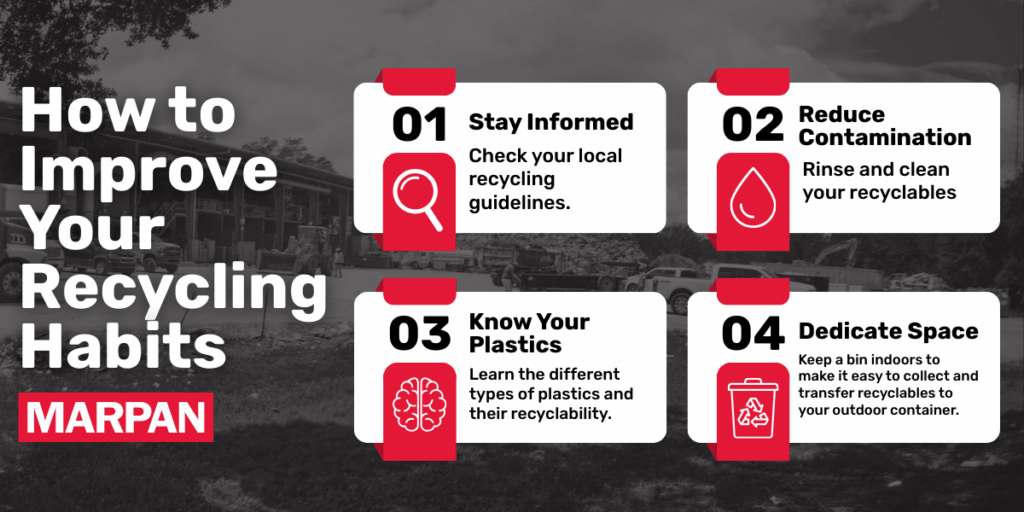
Debunking Recycling Myths to Recycle Smarter
Still unsure what’s recyclable in your area? Believing outdated or incorrect information can actually do more harm than good, contaminating recycling streams and sending otherwise recyclable items to the landfill. Don’t guess; get accurate answers from your local recycling program. Most centers offer up-to-date lists of accepted materials and tips on how to prepare items.
Tallahassee and Leon County residents: Download your local recycling guide.
About Marpan
Marpan has led Tallahassee and North Florida in debris management and processing of residential and commercial recyclable materials since 1966. Between 2008 and 2024, our recycling facility has recovered more than two billion pounds of material that would have otherwise been buried in a landfill. Our partnerships, long-time commitment to recycling and state-of-the-art facilities allow us to make a difference in our community every day. For more information on how and what we recycle, explore our services.

